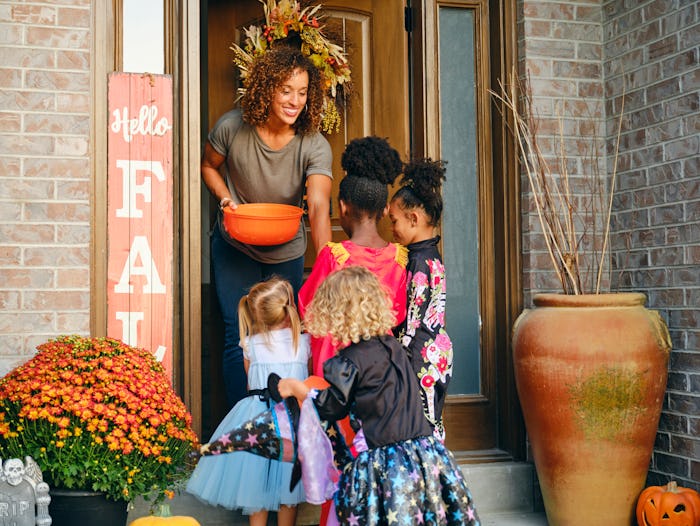Halloween

Is Trick Or Treating Safe This Year? Experts Weigh In
Yes, with a few caveats.
Are we really having this conversation again? That’s the question running through so many parents' minds when it comes to the safety of whether or not to green light this year’s trick-or-treating. With the pandemic still raging, families have been forced to make tough choices regarding holiday merrymaking for nearly two years. But the head of the Centers for Disease Control and Prevention (CDC) has some good news: it’s safe to trick or treat this year, provided you follow a few guidelines.
Is It Safe to Trick or Treat?
Rochelle Walensky, Director of the CDC, told Face the Nation that provided the merrymaking takes place outside, then yes, it is safe to trick or treat this year, NBC reports.
“I wouldn’t necessarily go to a crowded Halloween party, but I think that we should be able to let our kids go trick-or-treating in small groups,” Walensky said.
Her stamp of approval came just days ahead of the announcement that Pfizer-BioTech had submitted data to the Food and Drug Administration to approve its Covid-19 vaccine for use in children ages 5 to 11, NBC also reports.
Dr. Gary Kirkilas, a pediatrician at Phoenix Children’s Hospital agrees that we should all enjoy Halloween this year. “My only concern is kids clustering at doorsteps,” says Dr. Kirkilas But he says as long as parents manage candy distribution and flow and kids mask up, trick-or-treating outside is safe.
“You know kids could make their mask part of their costume,” adds Dr. Kirkilas. “If you’re a cat, you could decorate it with whiskers, for example.”
The timing is another sign that a happier Halloween might be on the way. While the FDA is expected to take a few weeks to review the vaccine trial data, emergency use could come ahead of Halloween, meaning children might be able to get a first dose before they put on their costumes.
"I would imagine in the next few weeks they will examine that data and hopefully give the O.K. so we can start vaccinating children hopefully by the end of October,” Dr. Anthony Fauci, the nation's leading immunologist, told MSNBC's "Morning Joe" show.
Does The Vaccine Ensure Halloween Safety?
However, it’s important to remember that a first jab does not equal immunity. Like the Pfizer shot for adults, the vaccine for ages 5 to 11 will be a two dose regimen of 10 micrograms, meaning “people aren’t considered fully vaccinated until 2 weeks after their second dose,” according to the CDC. So while children in that age range might be on the road to full vaccination come Halloween, depending on the date of their shots, they might not be be fully protected and therefore still susceptible to infection.
And no vaccine has been made available yet for children under the age of five. Progress continues in the trials for that age group with reports from Pfizer in September indicating that clinical trial data could be released on how well its Covid-19 vaccine works in 6-month to 5-year-old children as early as the end of October, CNBC reports. That data, however, will still need to be reviewed by the FDA and given emergency authorization before any hard timeline for vaccinations can be released.
This is all to say that while we can be cautiously optimistic about a more normal Halloween this year, parents need to remain diligent in order to protect children, especially as the Delta variant continues to increase the numbers of hospitalized kids with children ages 0-4 years having the highest pediatric hospitalization rates since the start of the pandemic in mid-August and children and adolescents hospitalization rate nearly five times the weekly rate in late June and close to the peak in January, according to two studies reported by the American Academy of Pediatrics News.
Vigilance is key to a happy Halloween. So take Walensky’s advice and keep the party outside, in small groups, and wear those masks.
Expert
Dr. Gary Kirkilas, pediatrician, Phoenix Children’s Hospital
This article was originally published on